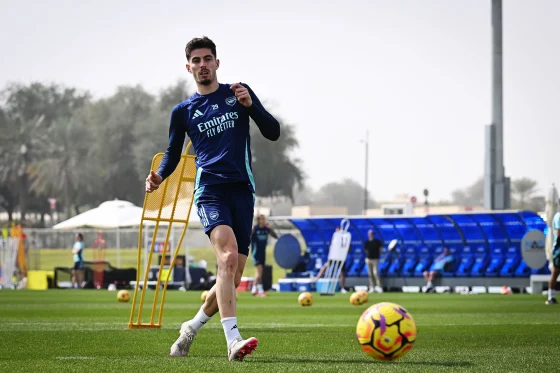Arsenal manager Mikel Arteta has criticized the congested soccer calendar, arguing that the increased demands on players are leading to a rise in long-term injuries. He expressed his concerns after Kai Havertz suffered a season-ending hamstring injury in training, a blow that compounds Arsenal’s existing injury woes.

Gabriel Jesus is recovering from an ACL rupture, Bukayo Saka has been sidelined with a hamstring issue since December, and Gabriel Martinelli is also expected to miss a month with a hamstring injury. Arteta pointed to the added Champions League fixtures, Arsenal’s deep League Cup run, and their Premier League title race as contributing factors to the heavy workload and subsequent injuries.
The already packed soccer schedule is set to intensify with an expanded Club World Cup in the US, a month-long tournament that will further burden players, despite Arsenal not participating this year. This tournament, along with the existing congested calendar, has drawn criticism from players who cite negative impacts on performance and health, even raising the specter of legal challenges and potential strike action.
Arsenal manager Mikel Arteta believes the increased workload and intensity of modern soccer are directly contributing to the rising number of injuries. While acknowledging the difficulty in definitively proving a causal link, he pointed to the sheer volume of games played by some players, citing examples of players with over 130 appearances in two seasons. He described such heavy workloads as “an accident waiting to happen.”
Arteta questioned whether the current injury crisis is a result of accumulated fatigue, stress, luck, preparation, or methodology, emphasizing the complexity of the issue. However, he was clear about the demanding nature of the schedule, particularly for explosive players.
Regarding Havertz’s injury, Arteta explained it as an unfortunate incident during a training session where the player stretched to stop a shot and felt his hamstring.
Arsenal’s extensive injury list, including players like Ben White, Martin Odegaard, Riccardo Calafiori, and Takehiro Tomiyasu, has led some to question Mikel Arteta’s training methods. In response, Arteta emphasized that his players are currently “training less than ever,” explaining how the sheer volume of games prevents adequate training and hinders player recovery.
He detailed how a lack of training impacts muscle and tendon health, stating that tendons require 72 hours to recover. Arteta argued that when muscles are undertrained and then subjected to the stress of frequent matches, the risk of injury significantly increases. He stressed that the problem isn’t what the team is doing “outside” of training, but rather the lack of training itself. He explained that repeatedly loading a muscle for matches without sufficient training over several weeks makes it more susceptible to injury because the tendon isn’t recovered or prepared to handle the recurring stress every few days.

